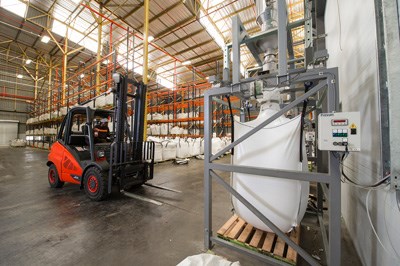
A PET revival
While recycled PET (rPET) can be used to make new products such as polyester staple fibre for clothing, home textiles, automotive parts and industrial end-use items, until recently this did not include turning it back into itself, that is taking the material produced to make the same bottles from which it came, thereby closing the recycling loop.
Not only does this assist with the carbon footprint of PET - in the last decade recycling PET bottles has saved over 650,000 tonnes of carbon - but it also limits its environmental impact from its operations.
Packaging and its production uses raw materials, energy and water and results in emission in the air, soil and water. In developed countries packaging accounts for about three percent of waste in a landfill. In South Africa this amount is double, that is six percent.
The packaging sector is constantly working to limit its environmental impact, says Ronald Fairbanks, General Manager of Mpact Polymer. "Generally there is a greater awareness of recycling at consumer level and with this we have seen a growth in the recycling of PET as the statistics by the PET Plastic Recycling Company (PETCO) shows. With the work that PETCO and others are doing, the amount of collected material has increased nicely."
In 2015 1.7 billion PET bottles were collected across the country, which is about 4.7 million bottles collected per day. This has also sustained over 50,000 income opportunities. In 2015 PETCO reported that for the first time, more PET bottles were recycled than were going into landfill. PETCO represents the South African PET Plastic Industry's combined effort to self-regulate post-consumer PET recycling.
Fairbanks maintains that the industry has a responsibility to recycle. "Key stakeholders in the industry are keen to have recycled material that they could substitute virgin material as this will have the effect of lessening the carbon footprint of their organisation, whether in production or through the actual product."
It was with this in mind that Mpact investigated setting up a recycling PET plant for bottle-grade recycling. Mpact began with its technical evaluation into setting up such an operation in 2013. By July the next year the project was approved and a year later Mpact Polymers was constructed.
Situated in Wadeville, Germiston the plant is a R350 million state-of-the-art operation and the first of its kind in Africa and one of only seven such operations worldwide that meets the Coca-Cola Company's full certification for PET bottles to package their soft drinks.
The operation enjoys the backing of the departments of Environmental Affairs (DEA), Trade and Industry (dti) and Economic Development (EDD) in promoting job creation, reducing waste to landfill and improving rPET production that will ultimately help to reduce the carbon footprint of the food and beverage industry.
It will process 29,000 tonnes of post-consumer PET bottles diverted from landfills each year, to produce 21,000 tonnes of rPET for food and beverage packaging. An estimated 186,000m³ of landfill space will be saved annually as a result, while C02 emissions will be reduced by approximately 53,000 tonnes each year.
 "We have been producing material since the third quarter of 2015," says Fairbanks, who explains that the process they use is a three-stage one that involves sorting, grinding, washing, and decontamination to transform used PET bottles into resin.
"We have been producing material since the third quarter of 2015," says Fairbanks, who explains that the process they use is a three-stage one that involves sorting, grinding, washing, and decontamination to transform used PET bottles into resin.
"This resin meets the needs of the most demanding food and beverage packaging applications. In the process, the strength of the product is also improved so that it matches virgin properties for bottle grade production. The material is re-used to make the same bottles from which it came, thereby closing the recycling loop."
The rPET product is known as Savuka - which means 'revival'."
Mpact Plastics is a leading producer of rigid plastic packaging and cling film in southern Africa. We operate out of nine production centres across the country, providing packaging from plants with relevant certifications. We service the food, beverage, personal care, home care, pharmaceutical, agricultural and retail markets. In upholding company values, and as a supporter of the circular economy, we positively contribute to industry associations, enabling various communities to participate in recycling solutions.
- Close the loop with us05 Dec 15:28
- Mpact packaging triumph at 2024 IPSA Gold Pack Awards28 Nov 15:07
- Employee wellness at Mpact Plastics30 Oct 14:47
- Optimise efficiency and costs with custom-designed packaging04 Oct 13:01
- A peek into Mpact’s design centre08 Aug 13:54










